|
Woolcombers Street
Dover
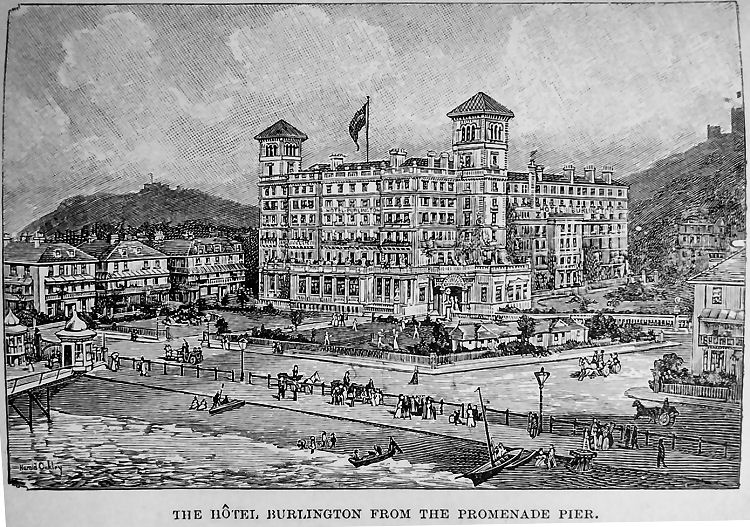
Above print, circa 1897, kindly sent by Paul Wells. Although it only
had one tower unlike the picture. |
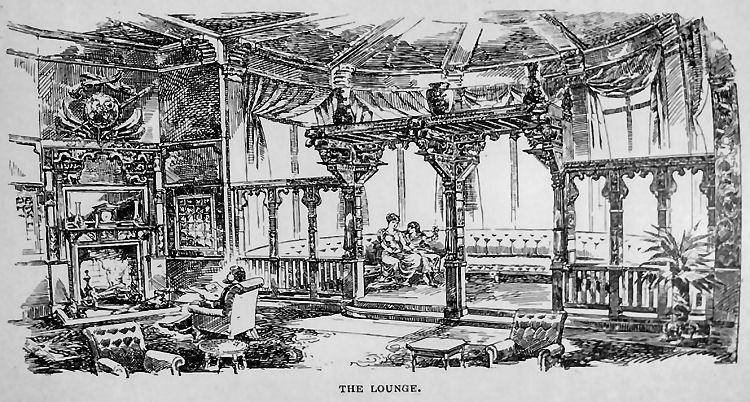
Above print, circa 1897, kindly sent by Paul Wells. |
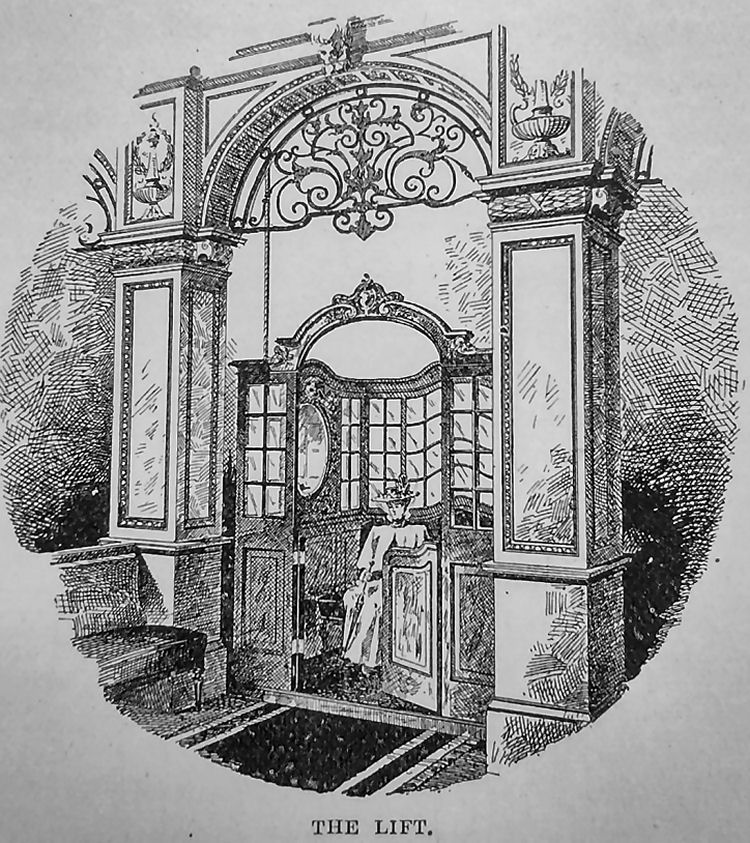
Above print, circa 1897, kindly sent by Paul Wells. |
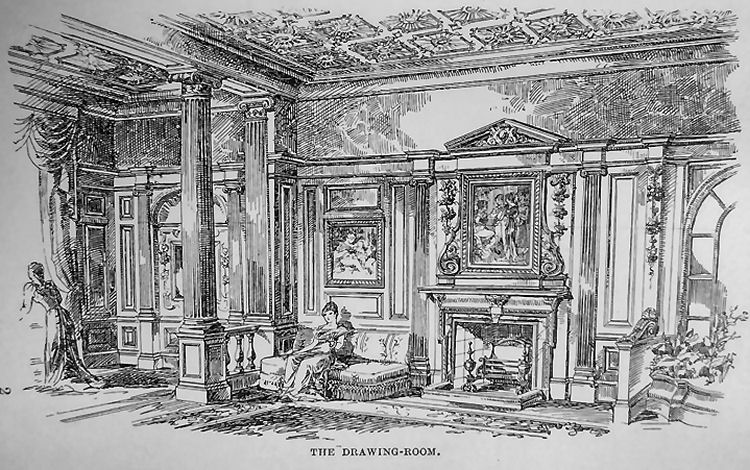
Above print, circa 1897, kindly sent by Paul Wells. |
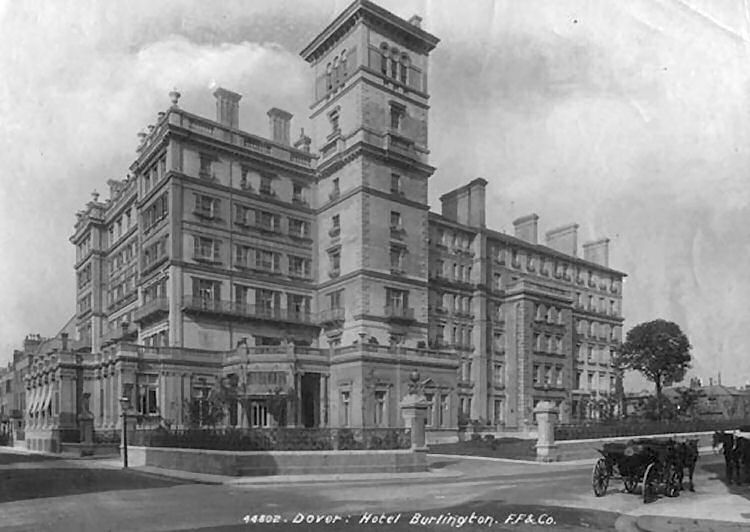
Above shows the "Burlington Hotel" 1898. |
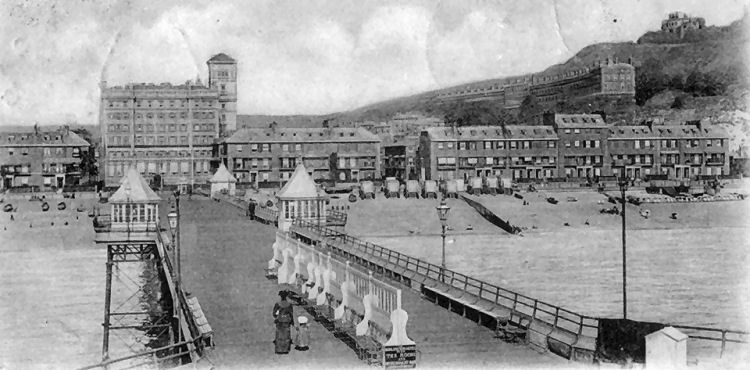
Above photo, circa 1900, kindly sent by Paul Wells. |
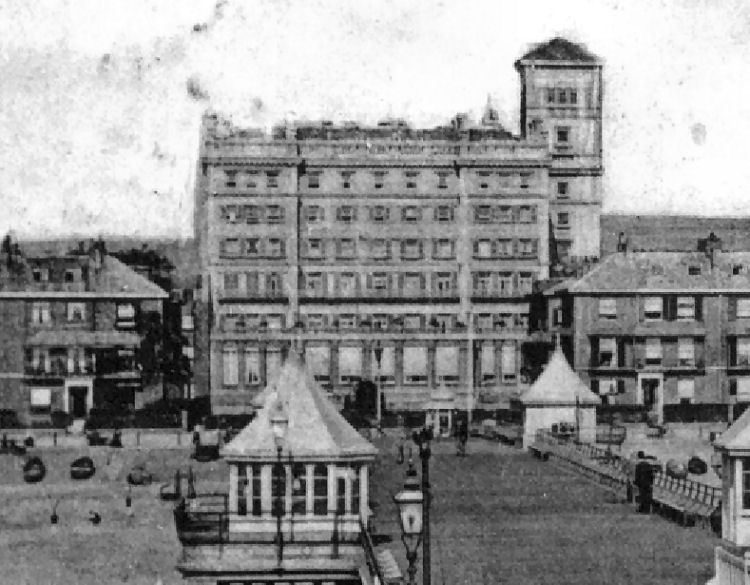
Above photo, date unknown. |
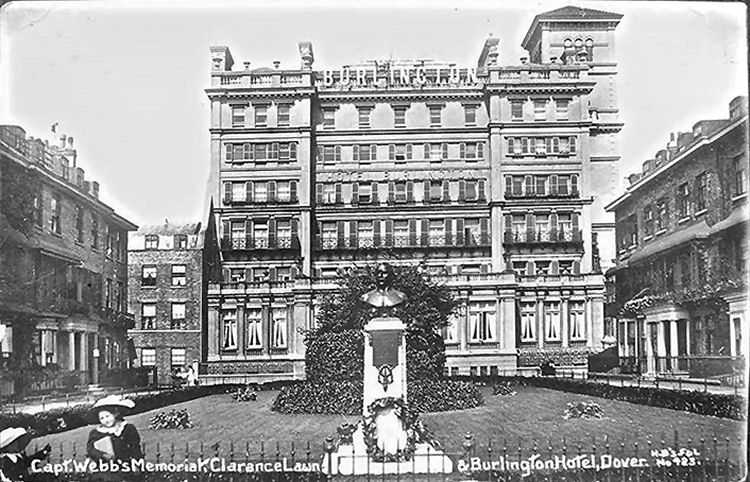
Above postcard, posted 1911. |
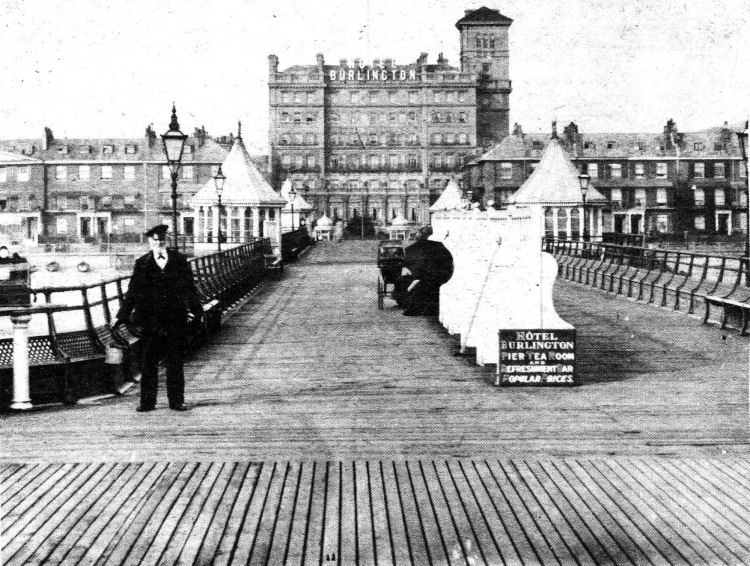 |
|
A victim of Hitler war damage, the majestic Burlington
Hotel as viewed from the long gone Promenade Pier, (the pier disappeared
in 1926). The hotel appears to
be on the seafront, but the camera lies. Most if not all the building
was on the landward side of what we know today as Townwall Street, as
will be seen by the aerial picture below of about 1929, (below). In the centre is Woolcomber Street and extreme right, with Marine Court in front, can be
made out the foundations of the gasometer of the old Trevanlon Street
gasworks. |
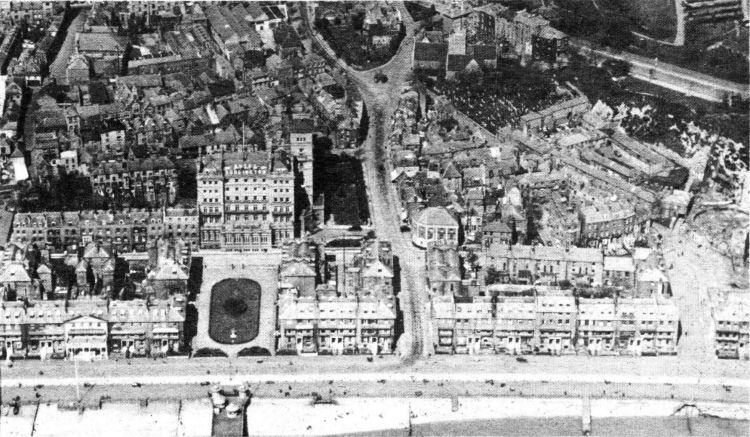 |
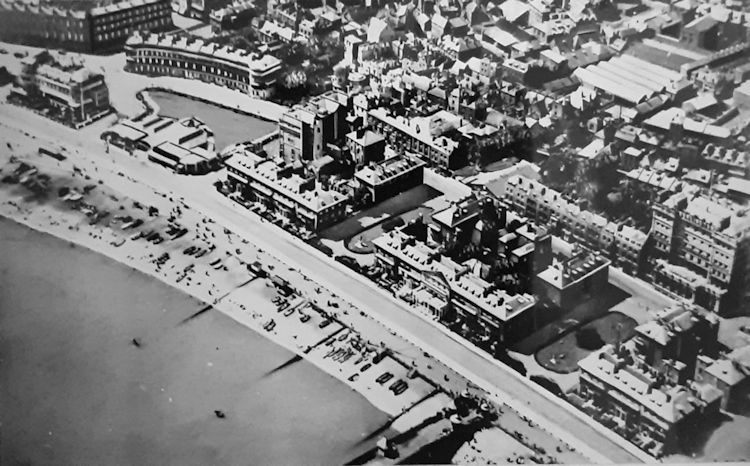
Above photo showing the "Burlington Hotel," "Grand,"
"hall of Camden," the "Cinque Ports Yacht Club," with the portico, and
many building of St. James area behind. |
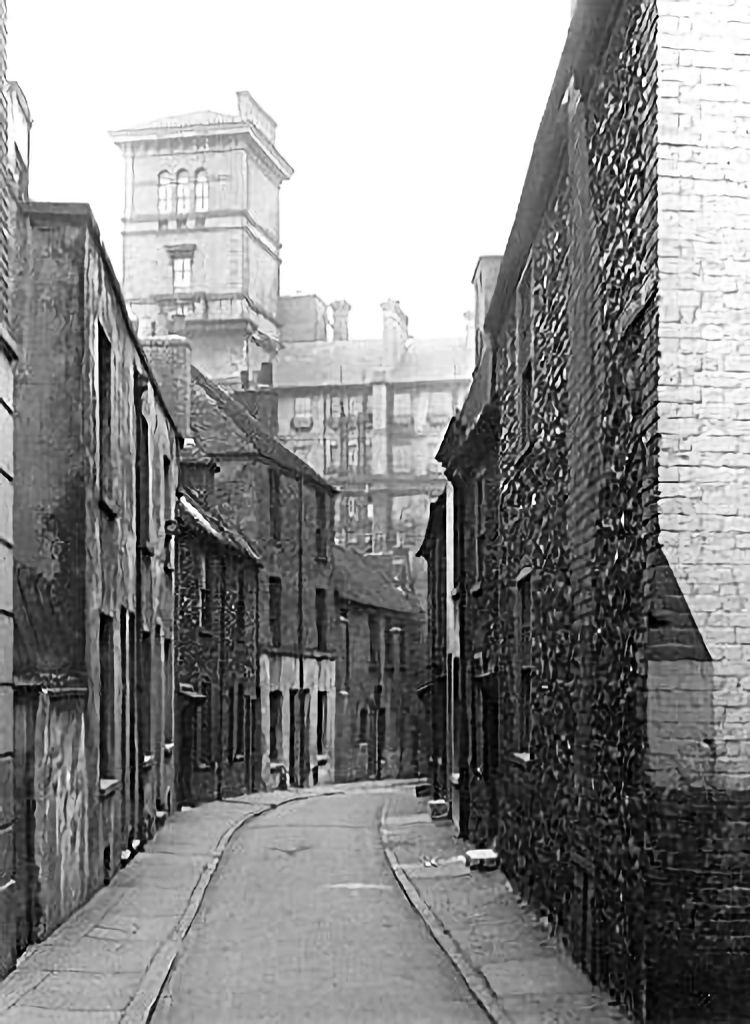
Above photo looking down Woolcomber Lane towards Woolcomber Street, date
unknown. |
|
|
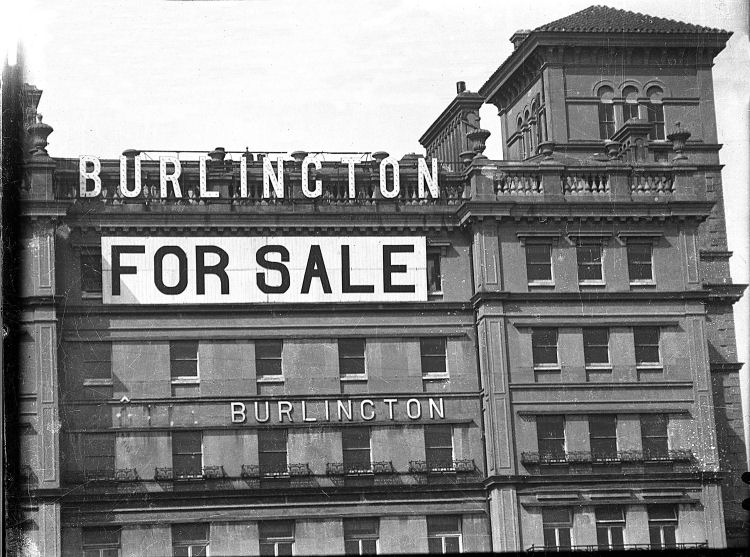
"Burlington for sale, date unknown. Possibly 1931. |
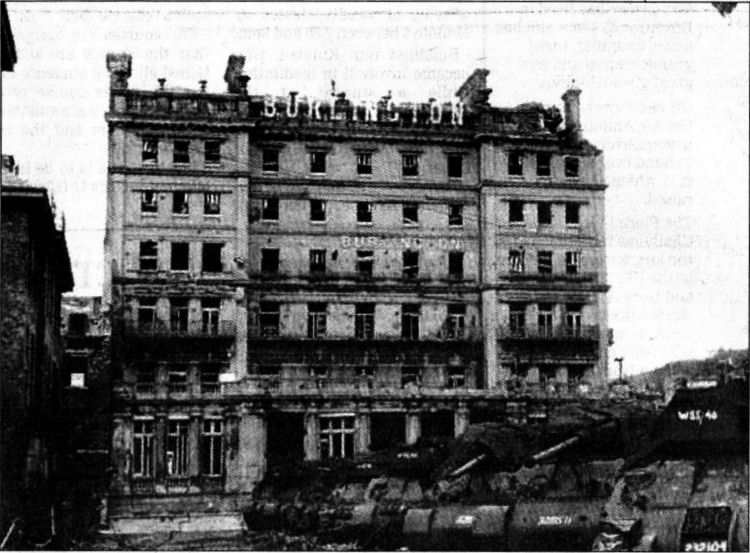
American tanks await shipment to the continent in front
of the damaged Burlington Hotel.
|
The "Burlington Bars" were an integral part of the "Burlington Hotel",
originally being built in 1864, the mansion and grounds belonged to the Rice
family, the occupant at that time being known locally as Madame Rice.
In the early 1860s speculators acquired the property, and a company
called the "Clarence Hotel" Company was
formed, and they set to work to erect a huge building that it was expected
would do big business. The hotel took over three years to build, but on the
anniversary of Queen Victoria's Coronation in June, 1865, the flag which
marked the completion of the tower was hoisted in the presence of a party of
guests connected with the Clarence Hotel Company Ltd. That company was
unable to complete their venture, and had to lease their undertakings in
1867 to the Imperial Hotel Company. Ltd.
It was
renamed the "Imperial Hotel" in 1867 when the lease changed hands. It
reached five storeys high and boasted 240 rooms but only 200 were completed
at it's opening. The stables were in the
same street but were later replaced by garages in rear of the hotel. The
Imperial Hotel Company provided the necessary funds for the completion of
the building, as to which a correspondent of the day, writing to the press
in September, 1865, regretted that the lack of funds had caused a standstill
to an enterprise which would "give a tone" to Dover. Eventually the "Imperial
Hotel" Co. completed the building and furnishing, being able to open it
on September 13th, 1867, when Mr. Alfred Smee, F.R.S. Chairman of the
Imperial Hotel Company, presided at a dinner at which Mr. W. R. Mummery, the
Mayor of Dover, was present. The architect was Mr. J. Whichcord, and it was
stated that, built in the Italian style, cost £75,000 to build and £25,000
to furnish.
It was estimated by the Chairman that if the hotel was always full the
receipts (in those days) would be £60,000 per annum, of which £30,000 would
be gross profit, and deducting £45,000 for rent and £15,000 for interest on
capital (a mortgage to a well known insurance company), said the Chairman,
it would enable an exorbitant interest to be payable to shareholders, as to
which possibility he was decidedly optimistic.
Unfortunately, the hotel was not always full and never really a viable proposition, it closed in 1871
unable to meet the mortgage charges. Closed till 1897 and following extensive
alterations at great expense by Messrs. Maple and Co. for the Frederick
Hotels Company, reopened on July 24th, 1897 as the "Burlington Hotel".
For some years afterwards it was successful, and during the visit of the
British Association in 1899 housed many celebrated scientists who came to
Dover.
In the war 1914-18 its ballroom was the scene of many Naval and Military
dances. The late Mr. Arthur Burr, the Kent Coal financier, for several years
had a flat at the hotel for use during his visits to East Kent during the
works of exploration and boring for coal at the beginning of the century.
|
Dover Express 7th May 1909.
LICENSING.
The only business to come before the Magistrates was an application by
Mr. Thomas Appleton for an occasional licence in respect to the
Conservative smoking concert at the Town Hall and an application by the
manager of the "Hotel Burlington" for an extension for a subscription
dance on Friday.
|
|
From the Dover Express and East Kent News, Friday, 2 January, 1914. Price 1d.
SAD CHRISTMAS TRAGEDY AT DOVER HOTEL
On Christmas morning, Mr. Frederick A. H. Snow, aged 19 years, an
engineering pupil, who was staying at the “Burlington Hotel” with his
parents, was found dead in bed, and a glass test tube, containing
prussic acid, was discovered under the bed.
The Borough Coroner held the inquest at the “Esplanade Hotel” on
Saturday afternoon, when the Jury returned a verdict of death from
suicide during temporary insanity due to over-studying.
Mr. H. Ward was chosen as the foreman of the Jury, who after viewing the
body at the Mortuary, heard the following evidence.
Mr. Hastings Frederic Snow, a retired engineer, living in Hartlipp,
Suffolk, said: The body at the Mortuary is that of my son Frederick
Annandale Hastings Snow. He was 19 years of age, and was an engineering
student of the University London. He was my only child. He came down to
Dover with me on Monday, December 22nd. We came by motor car, and took
rooms at the “Hotel Burlington.” He appeared to be perfectly well. On
Christmas Eve we spent the evening together at the hotel, and listened
to an entertainment there. About 10.30 p.m. he said he thought that he
would go to bed, and did so. On the following day, Christmas Day, Mrs.
Snow and I went to the 8 o'clock service at St. James's Old Church. When
I returned from Church I was met by Dr. Ord who told me what had
happened. I went to the room, and saw my son lying in bed, in the
position he usually did when asleep. He was dead. I saw a white stain on
his lips, and was told that the glass tube (produced) was found in the
room. He was in the habit of using these tubes. He was a very studious
youth, and was absolutely wrapped up in his work, always working out
problems and mathematical sums. He complained on the day after we
arrived that he had not slept well. He enjoyed good health, but was
somewhat reserved and usually only talked on matters which he took an
interest in. He understood chemistry, and up to the last moment was
working out mathematical problems. Witness also produced two books in
which, he said, deceased had been working out these problems up to 7
p.m. the previous day to his death. Mr. Snow said the problems were far
beyond his (witness's) understanding. Deceased had been discussing the
future, and was arranging to go to Bournemouth, and the resuming of his
duties in London. He was also discussing the question as to what the
Greeks could have used the things in the books for because they knew
nothing of modern science, and one could only apply these problems to
modern science.
In reply to questions, witness said that deceased brought no
photographic apparatus with him which would necessitate his having any
chemicals. He sat for an examination in June, and was working up for his
final examination, which he would have sat for within a few months, in
order to obtain the degree of Bachelor of Science. There was no reason
for him to have the tube with him when on a visit to Dover.
Mr. Frank Thomas Pierce said: I am a porter at the “Hotel Burlington.”
On Christmas morning soon after 8 o'clock the chambermaid told me she
could not make the deceased hear he knocks at his door. I found that the
door, which locks itself from the inside was fastened. I opened the door
with the chambermaid's key, and looking in the room saw the deceased
lying in bed apparently dead. I informed the manager.
Dr. R. Ord, in medical practice in Dover said: About 8.35 a.m. on
Christmas Day I received a telephone message from the “Hotel
Burlington,” in consequence of which I immediately went to the hotel
where I saw the deceased lying in bead, dead. Rigor Mortis was well
developed, and he had apparently been dead some hours. There was a
considerable amount of froth about his mouth, and his eyes were fixed.
His left hand was contracted as if by a spasm. I looked round the room,
and under the bed, found the glass tube (produced) which contained a
little prussic acid, a very rapid poison. From what I saw, and the
symptoms, I am of opinion that death was due to poisoning by prussic
acid.
The Coroner said that the paper wrapped round the cork in the tube was
part of a page out of the deceased's diary, and Mr. Snow produced the
diary, and showed that the paper corresponded with a torn page in it.
Witness also said that when deceased was packing his bag the tube fell
out of his pocket, and when asked if he had broken it, he said it was
only something for testing purposes.
Insp. Scutt said: On Christmas Day about 10.p.m. I went to the “Hotel
Burlington” where I was shown the deceased who was lying in bed. I
searched the room, but found nothing to throw any light on the matter. I
later removed the body to the Mortuary.
The Coroner then summed up, and expressed his deep sympathy with the
father at the loss of such a promising young man.
Mr. Snow, in answer to a Juryman, said deceased took nothing at night to
produce sleep.
The Jury's verdict was that deceased committed suicide during temporary
insanity caused by over-studying. They also expressed their deep sympathy
with his parents.
The funeral of Mr. F. A. H. Snow took place at Haslip Churchyard, near
Sittingbourne, on Tuesday, the deceased being interred in the family
grave. The service was conducted by the Rev. J. S. McMillan (vicar), and
there was a large assembly of relatives and friends, the deceased's
father having been a prominent resident of Haslip several years ago.
About thirty beautiful floral tributes were sent, and the arrangements
for the funeral were carried out by Messrs. Flashman and Co., of Dover.
|
|
From the Dover Express and East Kent News, Friday, 10 April, 1914. Price 1d.
LICENSING
The management of the “Burlington Hotel” were granted extensions to 3
a.m. on Saturday, April 18th, and Saturday, April 25th, for private
dances arranged by Major Hevman.
|
|
From the Dover Express and East Kent News, Friday, 27 July, 1917.
BURLINGTON HOTEL LIGHTS.
At the Dover Police Court on Monday, before Messrs. J. H. Back (in the
chair) and H. Hobday.
Winnie O'Conner and Mary Jinks, two employees at the “Burlington Hotel,”
were summoned for, on July 12th, failing to screen a light in a room of
the “Burlington Hotel.”
The defendants pleaded not guilty.
Mr. Vosper prosecuted, and stated that the proceedings were taken
against these defendants, as they were the occupiers. Although the
windows had been provided with dark curtains, there must have been
considerable carelessness. As the building was a very prominent one, it
was a serious matter.
Captain Smith, commanding the Special Service Section, said that on July
12th he received instructions to investigate light s that were coming
from the “Burlington Hotel.” At 11.20 p.m. he saw the light from the
Maison Dieu Road. At 11.35 it was still visible, and he went to the
hotel and saw the Manager. He took witness to the sixth floor, and to
room 382, occupied by the defendants. They went into the room, but the
light was not on. The window was half open, and the blinds had not been
drawn. It was put on, and found to be the same one as seen before. There
had been several complaints as to the light from the residents in Maison
Dieu Road. The defendants admitted that the light had not been long out.
It was itself shaded with dark felt. One of the defendants said that she
had not been in Dover very long, and did not realise the importance of
the matter.
In reply to one of the defendants, witness said that the Venetian blinds
were down, but were not folded. The defendants complained of the heat of
the room. He told them that they could have the window fully open if
they like as long as the lights were not on.
The Chairman said that the lights must be put out in Dover the
defendants would be fined 5s. each, but it would be heavier the next
time.
|
On September 30th, 1924, the
owners, Frederick Hotels, closed down and opted instead to invest in the
"Lord Warden Hotel" from the Gordon Hotel Company, which was better situated to cater for cross channel
passengers.
|
From the Dover Express and East Kent News, Friday 2
October, 1925. Price 1½d.
FURNITURE TO BE SOLD
Messrs. David J. Chattel and Sons, of 10, Lincoln Inn Fields, London.
W.C.2. and Chislehurst, Kent, in Connection with Messrs. Worsfold and
Hayward, of Dover, have received instructions to sell, and will be
shortly offering by auction the furniture and effects of the "Hotel
Burlington." The furniture is of a very high quality, the Hotel having
been furnished by Messrs. Maple and Co. Ltd. In addition to the
furniture, we are informed by the Auctioneers that they will be
including the valuable oak panelling of the Smoking room with the oil
paintings which are very fine reproductions of pictures by famous
Artists. The Auctioneers also have for sale the valuable freehold
property which can be treated for privately.
|
|
From the Dover Express and East Kent News, Friday 15
April , 1927. Price 1½d.
BURLINGTON LICENSE FOR MR. H. CLARK
Transfer Sessions were held at the Dover Police Court on Friday,
before Messrs. W. J. Barnes, J. W. Bussey, Boley Scott, T. Francis, W.
Hollis, W. Bradley and Dr. C. Wood.
Mr. Rutley Mowll applied for the transfer of the licence of the
"Burlington Hotel," from the Secretary of the Fredericks Hotels Limited
to Mr. Herbert Clark, of the "Trocadero."
In reply to Mr. Bradley, Mr. Mowll explained that the bar premises
would be cut off from the remainder of the building plans for which he
was about to submit. The plans were submitted.
The Chairman said the transfer would be granted if the plans were
approved.
the transfer was granted and the plans approved.
|
For over a year between 1927 and 1929, the building was used as the
head-quarters of the Southlands Training College for Woman Students, whilst
their permanent quarters near London were being rebuilt. Afterwards, the
building was leased by the late Mr. C. W. Mason, and was the most striking
of his various formations of flats in Dover. He also let portions of the
buildings for various other enterprises such as a school and a bakery.
Eventually, it was taken over by a London investor, who spent a considerable
sum in improvements, and it was doing quite well as the Burlington Mansions
until the war came along and put "paid" to such efforts to provide for the
residential amenities of Dover.
|
From the Dover Express and East Kent News, 11 February, 1927. Price 1½d.
THE NEW USE FOR THE BURLINGTON HOTEL
The use to which the “Burlington Hotel” is to be put is to provide
temporary accommodation for a training College for teachers while their
new buildings are being erected at Westminster. The College in question
is Wesleyan, and is in charge of the Rev.H. H. Workman, D.D. The men's
training college is at Westminster (130, Horseferry Road) and the
woman's of which Miss Brunyate, M.A., is in charge – she is the sister
of Dr. Brunyate who was in practice in Dover some years ago – at
Southlands, Battersea. It is the latter that is to be rebuilt.
Work has not yet commenced, and it is said it will consist of patching
up the hotel for use. A large number of women to clean it and a few men
to carry out the repairs will be required. The college is expected to
remain at Dover for 18 months.
|
The "Burlington Hotel" was used for many and varied activities after,
with the bars now integrated into the Burlington Mansions complex which it
became in 1931 when converted into fifty flats.
|
From the Dover Express and East Kent News, Friday, 20 November, 1931. Price 1½d.
DANCING AT THE BURLINGTON
At the Dover Police Court on Monday, before Messrs. W. B. Brett and T.
Francis.
Mr. C. W. Mason applied for a music, singing and dancing licence for the
ground floor, “Burlington Mansions.” He said that dancing would take
place in the ball room only – and concerts in the other rooms.
The licence, until 11 p.m., was granted temporarily until the full
Transfer Sessions.
The Magistrates' Clerk said that each time it was desired to dance
beyond 11 o'clock, an extension would be necessary.
Mr. Mason said that he thought it would be needed every time.
|
|
From the Dover Express and East Kent News, Friday, 22 January, 1932. Price 1½d.
HOTEL EMPLOYEE'S CLAIM
Harold Henshaw v. Frederick's Hotels Ltd.
This was a claim for wrongful dismissal.
Mr. Medlicott, for the plaintiff, said he was in the employment of the
Frederick's Hotels Ltd., at the “Lord Warden Hotel” for two and a half
years and on December 11th, 1931, was summarily dismissed and told to
clear out before that night. The ground given was that the defendant's
manager considered the plaintiff's conduct a danger to the safety and
the morals of the women employed at the Hotel. His Honour would see in
the particulars a very serious charge made against him in regard to a
young girl employed at the Hotel. He contended that the reasons given
were false and untrue in substance and in fact, and no just cause or
excuse for dismissing the plaintiff. The claim was for damages for £100,
£6 having been paid into Court by the defendants with a denial of
liability, but it was not a question of money, but of clearing his
character.
His Honour said that the man was dismissed and the defendants had paid
the amount into Court for a month's notice. He should have though that
it should have been an action for defamation of character.
Mr. Medlicott said that there were technical difficulties in regard to
this and quoted a case which he contended gave His Honour authority to
award damages.
His Honour held that it was an action outside his jurisdiction.
Mr. Medleicott complained that in the defence put forward, it was not
even alleged if the complaint was true, it simply said “Whether true or
not.”
Mr. Mowll (for defendant) said it did say that it was an action that His
Honour could not try.
Mr. Dedlicott said that if it was so it was unfair and improper that
people of the prestige of the defendants should hide behind such a
clause. If there was nothing in it, why did they apologise and done with
it?
His Honour said that he could not consider questions he had no right to
consider. In his opinion there was no right of damages here. It was all
very well for a person to use a court to clear his character. There were
ways of doing that, but it was not there. He asked if the defendants
consented to judgement for £6 paid into court?
Mr. Mowll agreed.
His Honour said that the plaintiff had disclosed no clause of section
beyond the claim for board wages, £6. and he gave judgment for that
amount with costs to the plaintiff up to the time of payment into Court
and costs to defendants after that date.
|
|
From the Dover Express and East Kent News, Friday, 28 October, 1932. Price 1½d.
THE HOT DOG SALOON
Sir, - Will you kindly bring to the notice of your readers that the Hot
Dog Saloon mentioned in your paper of the 14th inst., as a low down
restaurant, is now carried on as the Burlington Dining Rooms in an
honourable straight forward manner, and entirely under new management.
E. J. Laidler.
|
|
From the Dover Express and East Kent News, Friday, 12 January, 1934. Price 1½d.
CLOSING THE BURLINGTON BAKE-HOUSE
The Recorder sat on Tuesday at Dover Quarter Sessions, to deal with the
Burlington Bake-house appeal the proceedings lasting all day.
Leslie Frederick Humphries, the occupier of the bake-house in the
basement of the old “Burlington Hotel,” appealed against the decision of
the Justices, who had confirmed the action of the Dover Corporation in
refusing to grant a certificate in respect of the premises as an
underground bake-house under Section 101 of the Factory Act of 1901.
Mr. H. J. Baxter appeared for Mr. Humphries, and Mr. B. H. Waddy for the
Dover Town Council.
Mr. Waddy entered a preliminary objection. He said the general grounds
of the appeal were that the Magistrates were wrong in law in deciding
that they had no power to grant a certificate and that they were wrong
in law in holding that the premises were not a retail bake-house. He
submitted that no appeal lay from the Magistrates to the Quarter
Sessions except by statute. The Summary Jurisdiction Act as amended by
the Criminal Justice Administration Act only allowed appeal to Quarter
Sessions from conviction to order, which was submitted, only allowed it
to be a defendant and not to a complainant or informant. In his
submission, the appeal should be by special case to the High Court and
could not be brought to Quarter Sessions. Section 145 of the Factory
Act, 1901, did not give power to appeal to Quarter Sessions, unless on a
conviction or order, and he submitted that the wording was similar to
that of the Summary Jurisdiction Act.
Mr. Baxter agreed that appeal could not be to Quarter Sessions unless
specifically given by statute. He based his right to appeal purely on
Section 145 of the Factory Act, 1901, which said that any person feeling
aggrieved by a conviction or order on determining a complaint or
information under this Act, might appeal there from to Quarter Sessions.
He submitted that the decision of the justices was an order made on
determining an information or complaint. The applicant was permitted
under the Factory Act to apply to a Court of Summary Jurisdiction and
any decision following upon his complaint must be no order, and he
submitted that what the Magistrates did was to make an order dismissing
the complaint, and that the order prejudiced the complainant and that he
was a person aggrieved.
The Recorded decided to hear the merits of the case before giving
judgement on the legal objection.
Mr. Baxter said the hotel was opened in 1893, although it had been built
before that. It was occupied by Fredericks Hotels, Ltd., from 1899 to
1924. The premises concerned in the case was underground within the
meaning of the Factory Act, in that they were more than three feet below
the footway of the adjoining road. In the daytime they had been used as
the hotel kitchen and at night bread was baked for the use of the hotel.
No bread was sold outside in the year of 1901. The bread baked was
supplied to the customers of the hotel as part of their meals and he
submitted that at the time the Act was passed the premises were a
bake-house within the meaning of the Act. The bread supplied to guests
with their meals was sold commercially.
Mr. Waddy said if that were so it might have astonishing results. Under
the Food and Drugs and Weights and Measures Acts, bread could only be
sold in loaves weighing a pound or multiples of a pound, and the person
selling it was bound to keep, in a conspicuous place in his premises, a
weighing machine suitable for weighing bread so that if a person in an
hotel asked a waiter for bread he must supply it in a loaf weighing a
pound or a number of pounds, and there must be in the dining room a
weighing machine to enable the weight to be verified.
The Recorder said if he were of opinion that the premises were not a
bake-house within the meaning of the law of the Act and that the Justices
were right in saying that they had no power to grant a certificate under
Section 101, that was the end of the case. If he were of opinion that it
was a bake-house, then would come the question of whether there was an
appeal or not.
Mr. Baxter suggested that the Recorder should in any case, try the
question of the suitability of the premises, as that would save his
client very considerable expense in taking the matter to the High Court,
and the Recorder decided to do this. During the lunch interval, he
visited the “Burlington” in company with Council on both sides, and
inspected the bake-house.
Clarence Wilbut Mason said that since 1931 he had been owner of the
premises formerly known as the “Burlington Hotel.” In March 1932, he let
the kitchen portion to Mr. Humphries under an oral agreement, first of
all at 5s. a week, and later at 7s. 6d. If the Recorder thought
alterations were necessary to make the premises suitable for a bake-house,
witness was prepared to do anything within reason.
Frederick George Hayward said that he had been in practice as an
architect for 43 years, and had constructed and examined a great number
of bake-houses in that time. He had inspected the “Burlington” bake-house.
Its area was 1,600 square feet, and the cubic capacity 19,000ft. there
were five windows, 5ft 4in wide and 7ft high, opening onto the area,
which had tiles walls and glazed lights in the roof. There was a
scullery adjoining the bake-house, which had a window opening into the
open air. There were several large ventilators. Some went through shafts
right up through the building to the open air, and others on to the
corridor. In his opinion, the premises would make a very good bake-house;
and there were many bake-houses he had seen which could not compare with
it for ventilation and light.
Cross-examined by Mr. Waddy: He did not think the present screen round
the ovens were suitable, but it could be replaced by ones which could be
lime whitened. He had had nothing to do with the underground bake-houses
since the 1901 Act was passed. The limit laid down by the Act was that
underground bake-houses must not be more than 3ft down; the one at the
“Burlington” bake-house was 9ft down.
William Taylor Hogben, of 10, Cherry Tree Avenue, Dover, a retired baker
said that he had been 40 years in the baking trade. He had been ten
years Social Secretary of the Dover Master Bakers' Association. He had
seen a good number of over-ground and underground bake-houses, and, in his
opinion, the one at the “Burlington” had a very great amount of
ventilation. Its natural light was good in comparison with other
underground bake-houses he had seen. Even in over-ground bake-houses it was
frequently necessary to use electric light.
Leslie Frederick Humphries, of 4, Clarendon Place, Dover , the occupier
of the bake-house, said that he had been the tenant since March, 1932. He
had one assistant, and in the course of the last two years he had
succeeded in building up a business. They put in the partition round the
ovens as it was too cold for the dough, and it was only meant as a
temporary structure until he saw how the business progressed. He had
never had any complaints from his customers regarding his bread. He had
been a baker for fourteen years, and had worked in five underground
bake-houses. In his view, the “Burlington” premises compared very
favourably with those as regards light and ventilation, and also with
some over-ground bake-houses. At the time he started the business he did
not know that an underground bake-house was forbidden, nor did he know
that he had committed several breaches of the factory Act.
Stanley Edward Tilbrook, of 161, Folkestone Road, Dover, chef at the
“Lord Warden Hotel,” said that from 1914 onwards he was working at the
“Burlington Hotel.” During that time bread was baked, a special man
being employed. There were never any complaints regarding bad light or
ventilation. While he was there, bread was baked not only for the hotel,
but also for the cross-Channel boats. He thought, with a suitable
screen, the place was quite suitable for a bake-house. When the hotel was
there a screen was not necessary because the range was burning and kept
the temperature up.
The Recorder remarked that the hotel supplying bread to the
cross-Channel boats seemed rather like casting their bread on the
waters!
Dr. A. R. McMaster, Medical Officer of Health for the Borough of Dover,
said that at the time the 1901 Act was passed he was practising at
Rochdale, and had to examine many underground bake-houses at the time in
connection with the Act. In underground bake-houses about four times more
bacteria and three times more carbonic acid would be found than in
over-ground bake-houses. Very often the bread produced underground was
quite wholesome, but the effect of the conditions was bad upon the
workers. He did not consider the “Burlington” premises suitable for a
bake-house. The ventilation of the part which was partitioned off where
the baking was done was quite inadequate; it had no access to the
outside air and the lighting was deficient. He did no think and
alterations would make the place satisfactory. There were three
underground bake-houses in Dover, one factory, and two workshops. None
was so much below as the “Burlington” and each had direct ventilation
and lighting. When he visited the “Burlington” he saw no evidence that
Mr. Humphries worked in any other portion except the closed off portion.
Cross-examined by Mr. Baxter: The provision of a glass partition would
improve the lighting, but it would not provide the sterilising effect of
direct sunshine. If Mr. Maton removed the covering of the area and cut
the wall back, there would be a great deal more air and light into the
kitchen as a whole, but the place would not cease to be an underground
bake-house. He had never had any complaints from Mr. Humphries customers.
Dr. Thomas John Nicholl, Deputy Medical Officer of Health for the
Borough of Dover, said that the ventilation of the kitchen depended for
its inlet upon outside passages, which he did not consider satisfactory.
He doubted if anything could be done to make these premises suitable for
a bake-house. The area of the kitchen was far too large, and it would
always be necessary to partition off a portion.
Alderman Alfred Richard Dawes, Chairman of the Dover Public Health
Committee, said that he was a retired baker. He retired about six years
ago, having carried on business in London Road between forty and fifty
years. He agreed that in the “Burlington” kitchen, if it were not all
being used, it would be absolutely necessary to pen off a portion to
keep the temperature up. He did not consider the premises suitable for a
bake-house, not did he think any alterations would make them suitable
under the Act.
Mr. Waddy said that the crux of the whole thing was the partitioned off
portion. If it were taken down the ovens could not be used, and while
there was a partition it interfered with light and ventilation. He
submitted, further, that a certificate could be granted conditional upon
certain work being done. The place had to be made before a certificate
could be granted.
The Recorder, giving judgement, said that the question of whether an
appeal lay before the Court in the circumstances was by no means clear.
An appeal could not be made to Quarter Sessions except by statutory
authority, and an appeal could be made by statutory authority where a
“conviction or order” had been made by a person who felt aggrieved by
that conviction or order. What had happened here? Up to a point the
bake-house question was in the hands of the Local Authority, and they had
to consider whether they would grant a certificate, the place being
admittedly an underground bake-house. They refused for certain reasons,
and the occupier, not being satisfied with the refusal for certain
reasons, in reality appealed for it to the Justices, and the Justices
made no order as they were of the opinion that in point of law they
could not make an order. They, in effect, dismissed the complaint. Now,
was there an appeal against the dismissal of the complaint (a) where the
dismissal was on a legal ground, (b) where the dismissal was on the
merits of fact? Clearly there was with regard to (a) an appeal but not
to Quarter Sessions, but by special case stated, and although the
grounds of the Justices in this matter were clearly legal, there did not
appear to have been any effective effort made to obtain a special case
stated by the Justices. (b) There had no been a hearing upon the merits
of the matter. The Justices decided that the law was not applicable. He
did not think that the position fell within the words “conviction or
order” in Section 145, and he had come to the conclusion that there was
no appeal on the matter to Quarter Sessions. The appeal, therefore,
would be dismissed, and the appellant must pay the costs. The Recorder
also dealt with the other two points he had been asked to hear. With
regard to the question of whether the premises constituted a bake-house
or not, he held that a hotel company with premises of this kind, which
were evidently constructed for the use of its visitors. If it produced
bread and caused it to be consumed by its staff or its visitors, could
not be said to be a bake-house within the meaning of its stature. If that
were so, whether there was no appeal or there was an appeal, the place
was not a bake-house, therefore no certificate could be given, even if he
or the Local Authority were asked to give one. The third matter was that
he had been asked, so far as he could be of any assistance in clearing
the air about this difficult case, to hear out the merits the evidence
which was appellant, assuming that he could appeal, and that the place
was a bake-house, would put forward and judge whether the appellant would
be entitled, on a re-hearing, to the certificate which the Justices
refused on a technical ground. After reviewing the evidence and the
arguments of Council, the Recorder said that he could not come to the
conclusion that he was satisfied that the bake-house was suitable for use
as regards construction, light, ventilation, and in all other regards.
|
|
From the Dover Express and East Kent News, Friday, 21
May, 1937.
BURLINGTON BALLROOM OPENED.
The new ballroom at the Burlington was officially opened by the Mayor
(Alderman G. M. Norma) at a dance there on Tuesday, in aid of the Dover
Hospital Linen League. There were about three hundred present, including
many distinguished guests, and from start to finish the dance went with
a swing and was most enjoyable. The Mayor, in declaring the ballroom
open, thanked Mr. Mott for organising that inaugural dance in aid of a
very deserving cause. The Mayor added that the ballroom would be an
asset to the town, and he wished the venture every success.
During the evening an excellent cabaret was given by Mr. F. C.
Overton and pupils of the Premier School of dancing. Prizes, which were
given away by Mrs. T. J. Cobbe (Hon. Secretary, Dover Hospital Linen
League) were won by Captain D. Maconochie and Miss Molesworth, Mr. L. J.
Pudney and Miss Joan Tattham, and Mr. and Mrs. Watts. Mr. F. C. Overton
was the M.C., and Bert Eastes' Clifton Band played the music for
dancing.
The ballroom has been decorated on attractive modern lines, with a
spacious lounge and bar adjoining. It is intended to let the rooms for
dances, lectures, etc.
|
It was an early casualty of world war two. The tower was struck in 1940
and shortly afterwards, in October 1940, another struck the huge water tank
on the roof. It seemed inconceivable that the five bombs which hit the hotel
on 7 September 1941 could have been delivered from one plane so it was
presumed that the bombs had been chained together. Howbeit, the structure
was left in such a dangerous condition that dynamite had to be employed to
partially self destruct.
Post war, fire on the upper floors in January 1946 resulted in further
damage and demolition of the whole then proved necessary. That took place in
1949, together with 8 Camden Crescent, the contractor paying £130 for the
privilege.
|
From the Dover Express and East Kent News, Friday 1 July, 1949.
BURLINGTON HOTEL
The Town Council on Tuesday accepted a tender for the demolition of the
“Burlington Hotel,” together with No 8. Camden Crescent.
The decision was taken on two reports from the Town Planning Committee.
The first meeting, on May 31st, received and opened 33 tenders received
in response to the advertisement. These were varied and ranged from the
highest, £23,973, down to a payment to the Corporation of £130. Next to
the £23,973 were tenders of £15,282 and £12,021, and at the other end of
a payment of £100 to the Corporation and another was free of charge. The
Committee referred all the tenders to the Borough Engineer for report.
At the Town Planning Committee meeting on June 16th, the Borough
Engineer submitted his report which recommended No. 22 (a payment of
£130 to the Corporation), and this the Committee recommended to the
Council for acceptance.
|
|
From the Dover Express and East Kent News, Friday, 12
August, 1949.
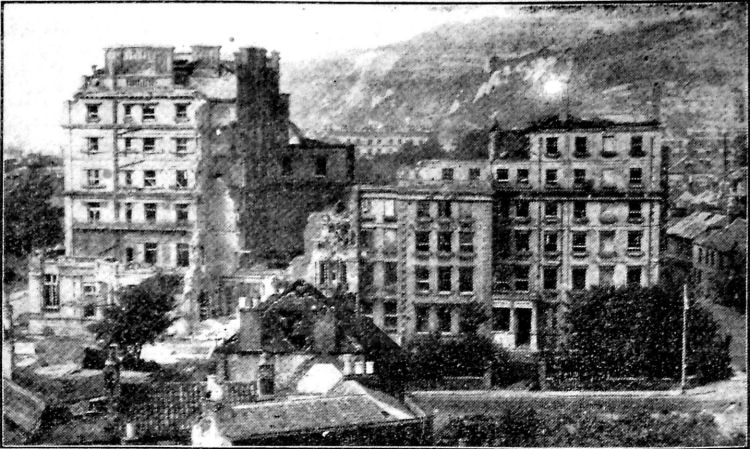
War damaged Burlington Hotel and demolition contractors have just
begun their work, which is expected to take four or five months to
complete. The hotel took three years to build, cost £75,000, and was
opened in 1867.
|
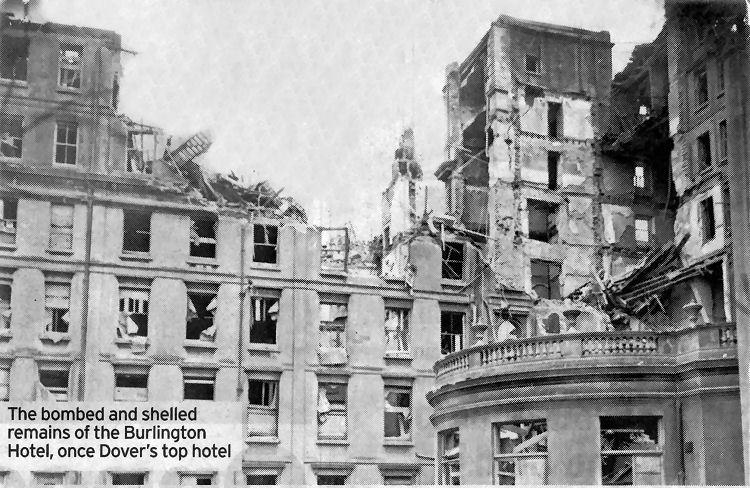
Above photo showing the bombing of 26 December 1944. |
|
From the Dover Express and East Kent News, Friday, 19
August, 1949.
THE BURLINGTON HOUSE COMES DOWN
CHEQUERED HISTORY OF DOVER'S BIGGEST BUILDING
While progress in the construction of new buildings claims chief
attention in these days, the demolition commenced last week of the
"Burlington," Dover's largest pre-war building, numbers the last days of
one of the town's most familiar and prominent landmarks. Before the war
an impressive grey, eight-storeyed building of 240 rooms, towering above
the surrounding Sea front premises, the "Burlington," repeatedly hot by
shells and wrecked by German bombs in 1941, has remained since , a vivid
reminder of Dover's war0time ordeal.
Since 1924, when it ceased to be used as an hotel it had a life of
varied changes and vicissitudes. For a year it was used as a temporary
headquarters of a training college for women students, next as flats
with the ground floor and basements taken over for a bakery, a school,
for several local organisations' club-rooms, and gymnasium, etc., until
subsequently it became Burlington Mansions, and, as such, provided
residential amenities for many townsfolk until the war paid to this
venture.
At the outbreak of war more than a hundred and fifty people
were resident there, but this number quickly dwindled in succeeding
months, and part of the premises were taken over by the naval
Authorities. The building suffered its first war-time blow in October,
1940, when a shell struck the huge water tank on the roof, sending
thousands of gallons of water flooding the floors below. About sixteen
people were actually living in the flats at the time, and though all
escaped injury, considerable damage was done to the building by the
water.
Soon after its first hit the Naval Authorities moved to the "Lord
Warden Hotel," but several families remained on while temporary repairs
were carried out with a view to opening the ballroom and adjoining room
as an Officers' Club. Then, in September, 1941 - not much more than a
week before the club was due to be opened - came the enemy raid which
spelt the end of the "Burlington" and cost three of the five remaining
occupants their lives. I stick of six high explosive bombs was dropped,
five of which struck the building, Mr. and Mrs. A. W. Decort, though
badly shaken, had miraculous escapes, but the other three, Mr. J. T.
Turner, a Warden on Z1 Post, his wife, Mrs. Rose Turner, and Sergt. W.
Horn, of the Special Constabulary, were all killed. Soon after, troops
blasted away remaining walls of the tower to render the place safer.
The North London Demolition Company, which has recently completed the
clearance of large sites on the Thames embankment in preparation for the
1951 Festival of Britain, are the contractors, and according to Mr. Tom
Laing, foreman of the Company's gang of twenty crack steeplejacks
engaged on the job, the work should by completed in four to five months.
In addition to this skilled labour the operation will provide temporary
employment for local men, taken on through the Labour Exchange, who are
required to assist mainly in salvaging materials, among which are
estimated to be a million good bricks. Much of the woodwork, including
the fine flooring, has suffered badly by the years of exposure to all
weathers, Mr. Laing says, and, to use his own words, "Most of the lead,
which should have been a valuable part of the salvage, has already been
swiped."
Demolishing a building of this size, is, obviously, at the best of
times a job which needs expert planning both before and during the
operation, and the steady worsening condition of the "Burlington" during
the years since the war - the tall toppling walls and chimney stacks,
insecure beams and rotting flooring - have added considerably to the
difficulties. each steeplejack has to know exactly where the others are
working, sorting and salvaging below must be carried out at safe
distances from falling masonry, the filling in with rubble of the
basement goes on all the while, and, almost a full-time job for one man,
is to keep too-interested onlookers from straying into the grounds. The
aim is to complete the job by the end of the year, and when it was
suggested that he might keep his eyes open for a cask of golden coins,
reputed to have been buried in the foundations, Mr. Laing's reply was,
"We shan't have any spare time looking for that sort of thing." The
demolition has been commenced in the centre of the building, will be
continued towards the St. James Street side, leaving the LiverpoolStreet
wing, which was surmounted by the tower, until last.
The operation draws to a close a venture which, started eighty-five
years ago, holds good and bad memories for many who were financially
associated with it. its history, going back to mid-Victorian days, makes
interesting reading. In the early part of the nineteenth century the
site was occupied by Clarence House, a mansion and grounds belonging to
the Rice family, the occupant at the time being known locally as Madame
Rice. In the early 1860s speculators acquired the property, and a
company called the Clarence Hotel Company was formed, setting work to
erect a huge building that was expected would do big business. The hotel
took over three years to build, but on the anniversary of Queen
Victoria's Coronation in June, 1865, the flag which marked the
completion of the tower was hoisted in the presence of a party of guests
connected with the Clarence Hotel Co., Ltd. That Company was unable to
complete their venture, and had to lease the undertaking in 1867 to the
Imperial Hotel Company, Ltd., who changed the projected name of the
hotel from Clarence to Imperial.
Eventually the Imperial Hotel Co. completed the building and
furnishing, being able to open it on September 13th, 1867, when Mr.
Alfred Smee, F.R.S., Chairman of the Imperial Hotel Company, presided at
a dinner at which Mr. W. R. Mummary, the Mayor of Dover, was present.
the architect was Mr. J. Whichcord, and it was stated that, built in the
Italian style, the hotel cost £75,00 to build and £25,000 to furnish.
there were 240 rooms, but only 200 were then completed. It was estimated
by the Chairman that if the hotel was always full the receipts (in those
days) would be £60,000 per annum, of which £30,000 would be gross
profit, and deducting £4,500 for rent and £15,000 for interest on
capital (a mortgage to a well-known insurance company), said the
Chairman, it would enable an exorbitant interest to be payable to
shareholders, as to which possibility he was decidedly optimistic.
Unfortunately, the hotel was not always full, and in march, 1871, it was
closed, presumably as a result of being unable to meet the mortgage
charges.
It remained closed until 1897, when it was restored at great expense
by Messrs. Maple and Co. for the Frederick Hotels Company, who reopened
it on July 24th, 1897. For some years afterwards it was successful, and
during the visit of the British Association in 1899, housed many of the
celebrated scientists who came to Dover. In the war 1914-1918 its
ballroom was the scene of many Naval and Military dances. The late Mr.
Arthur Burr, the Kent Coal financier, for several years had a flat at
the hotel for use during his visits to East Kent during the work of
exploration and boring for coal at the beginning of the 20th century.
The final closure as a hotel was in September, 1924, when the
Frederick Hotels Co. took over the lease of the "Lord Warden Hotel" from
the Gordon Hotels Company.
|
|
From the Dover Express and East Kent News, Friday, 9
September, 1949.
SPEEDY DEMOLITION
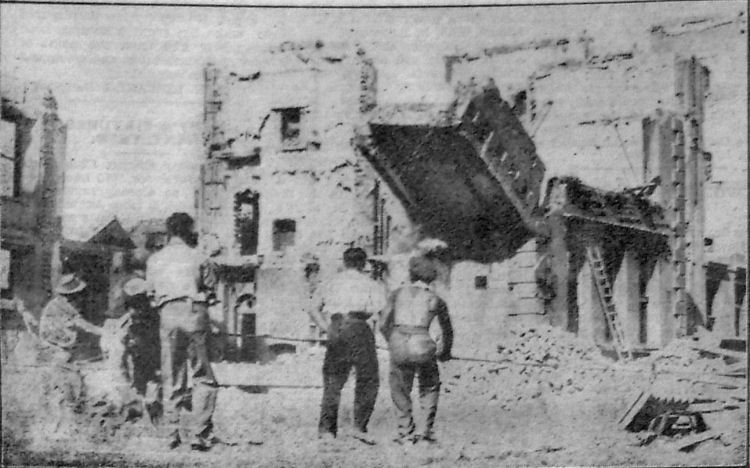
Rapid progress is being made by the contractors in the demolition of
"Burlington House." In this picture, several tons of masonry are brought
crashing to the ground by a steel hawsey mechanically operated.
|
|
From the Dover Express and East Kent News, Friday, 23
September, 1949.
STOLE WOOD FROM "BURLINGTON"
Pleading guilty to stealing pieces of wood from a stack of timber
salvaged from the "Burlington Hotel," George Thomas Hadley, a 36 year
old porter, living at 3, Castlemount Road, was bound over for a year
when he appeared before the Dover Magistrates on Monday.
Inspector Wilkinson told the Court that at ten past nine on September
15th, P.C.'s Hunt and Steggles, in the Police car, saw defendant
carrying some timber along Woolcomber Street from the direction of the
Sea Front. When questioned as to where he had obtained the wood, he
replied, "I took it from the pile in Clarence Street. As it was old wood
I took it for firewood." Mr. T. H. Lang, a foreman employed by the firm
of contractors demolishing the hotel, said Inspector Wilkinson, had
identified the wood as being similar to that which had been salvaged,
and valued it at six shillings.
Defendant in evidence, said he only wanted the timber for firewood,
and he was in the habit of taking old wood home. It was just the same as
timber laying around on bombed sites throughout the town.
Announcing the Magistrates' decision the Chairman (Mr. H. T.
Hawksfield) told Hadley that whether it was new or second-hand timber,
it was still someone's property. He was bound over for a year, in the
sum of £5.
|
|
From the Dover Express and East Kent News, Friday, 21
October, 1949.
ST JAMES' DISTRICT TODAY
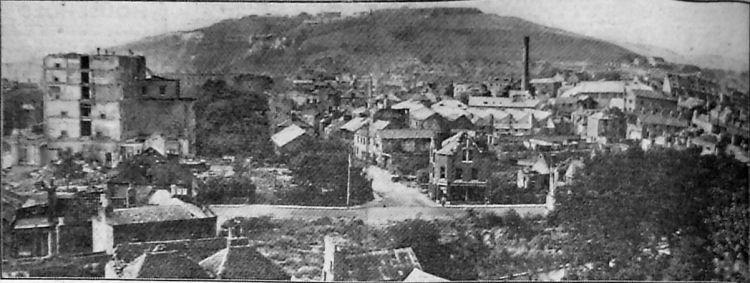
This view, taken from Castle Hill, shows, in the main, the parish of
St. James', the most war devistated area in the town. In the left
foreground is the Trevanion Street district which was scheduled for
improvements under a Slum Clearance Scheme before the war. Beyond it, in
all that remains of the "Burlington Hotel," now in the hands of
demolition contractors. the right foreground is of St. James' Old
Churchyard and beyond can be seen the roof of the re-constructed bus
garage and of the Granada.
|
|
From the Dover Express and East Kent News, Friday, 25
November, 1949.
CHANGING VIEWS
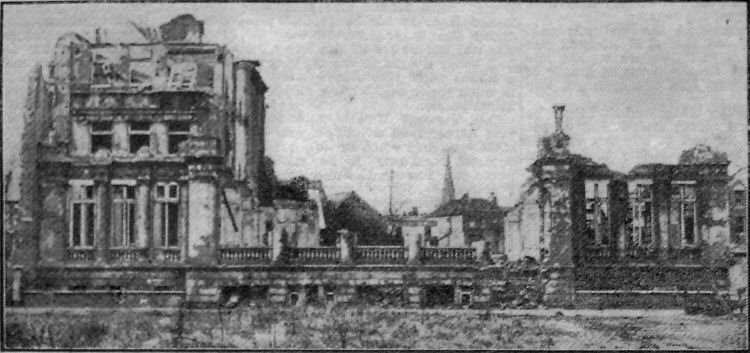
The last stages in the demolition of the "Burlington Hotel" are
[providing new views from various parts of the town. From the Sea Front
the spire of St. James Church can be seen, but when the site is finally
cleared the view will be less pleasant, for the area of devastation
adjoining will be revealed.
|
Dover Corporation paid £4,575 for the site in 1951 and an additional £315
for the liquor licence. Thus, in 1955, the licence of the "Burlington
Buffet" was transferred to Watney, Combe and Reid, brewers, who later used
it at the "Dover Stage Hotel".
|
From the Dover Express, 29 June, 1951.
CORPORATION BUY A LICENSE.
An "Ultimate Advantage"
DOVER Corporation is to buy the liquor license in respect of the
Burlington Hotel, demolished nearly two years ago, and long disused as
licensed premises.
The decision to purchase the license was made by the Town Council on
Thursday, when two Committee reports on the subjects were placed before
members.
The report of the planning committee stated that the Town Clerk
informed the Committee that the Justices' license in respect of the
premises could be purchased for 300 guineas.
"We are of option," the Committee reported, "that it would be of
ultimate advantage to the Corporation to acquire the license at the
price mentioned.
They recommended that the license be purchased on those terms and
that steps be taken by the Town Clerk to have the license transferred
into his name as the Corporation's nominee.
The Finance and General Purposes Committee agreed with a suggestion
from the Planning Committee that the license should be purchased out of
the £6,547 received by way of compensation for the loss of the
Corporation electricity undertaking.
Their recommendation that this be done was approved by the Council.
|
The post war years saw redevelopment of the whole area.
LICENSEE LIST
WAIN Leonard 1877-Jan/1900 (Burlington Hotel
manager)
 
HUTCHINGS George Dyley Jan/1900+
 (Secretary to Frederick Hotels)
(Secretary to Frederick Hotels)
BAKER Samuel 1901+ (Manager age 28 of "Burlington
Bars")
FALKNER R G 1901 (Burlington Hotel)
SALE Lewis William 1903 (Burlington Hotel)
ACKLAND Percy 1916+ (age 37 in 1916)
FREDERICK HOTELS LTD. 1923-24
 
NEWMAN Mr 1923-24 (Burlington Hotel)
Secretary Frederick Hotels Ltd to Apr/1927

 CLARK Herbert Apr/1927-Dec/37 (Burlington Bars)
CLARK Herbert Apr/1927-Dec/37 (Burlington Bars)

MASON C W 1931? (Burlington Bars)
WATSON George William 1933-36 end? (Burlington)
MOORE William Dec/1937-40 end (Burlington Bars)

A Herbert Clark also ran the "Trocadero"
between 1919 and 1934.
 From the Kelly's Directory 1899 From the Kelly's Directory 1899
 From the Post Office Directory 1922 From the Post Office Directory 1922
 From Pikes Dover Blue Book 1923 From Pikes Dover Blue Book 1923
 From Pikes Dover Blue Book 1924 From Pikes Dover Blue Book 1924
 From Pikes Dover Blue Book 1938-39 From Pikes Dover Blue Book 1938-39
 From the Dover Express From the Dover Express
|


















